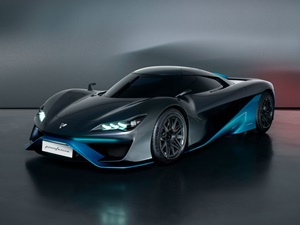Viritech, a clean technology start-up that develops solutions and technology powered by hydrogen, has unveiled the Viritech Apricale, a hydrogen-fuelled hypercar with 1,072bhp.

Viritech, which developed the powertrain technology for the hydrogen-fuelled hypercar with automotive design major Pininfarina providing the design, plans to put the Apricale into limited production in 2023.
Viritech claims the Apricale is a revolution, as it is the only hypercar to provide a zero-emissions powertrain in a car whose weight is the same as a petrol-powered equivalent – and half that of some battery-electric equivalents.
“Using expertise gained in F1 and other top motorsport series, we set the apparently impossible target of zero-emissions in a hypercar weighing 1,000kg. That is what led to the development of a unique powertrain using a combination of hydrogen fuel cells and fast charge/discharge batteries inspired by F1 ERS (Energy Recovery System),” says the company.
The revolutionary powertrain is complemented by a motorsport-inspired chassis, and a body built by the automotive icon, Pininfarina. The Apricale achieves the apparently impossible: the handling of the best petrol-engined hypercar with lower lifetime emissions than a battery-electric alternative, according to Viritech.
“Traditional fuel cell architectures mean that the fuel cell is not used to its full advantage, the batteries are very large, and the hydrogen tank installations are extremely heavy. We have systematically developed solutions that result in a smaller, lighter, more efficient powertrain,” says Matt Faulks, CTO of Viritech.
The Apricale is powered by a 400kW electric motor on each axle, which delivers the headline power figure and all-wheel drive, as also 738lb ft of torque.
The car can accelerate from 0-62mph in under 2.5 seconds and gain a top speed of 200mph, Viritech claims. It’s a single-speed transmission, with a 6kWh lithium-ion battery.
According to Viritech, the Apricale can charge and discharge those cells fully in under a minute, allowing it to recoup unprecedented levels of energy through regen braking. This allows for a projected range of more than 350 miles.
Apricale’s hydrogen tanks are a structural part of the carbon fibre composite monocoque.
Both the fuel cell and battery can power at any given time, with Viritech suggesting that the battery will take care of low speed and the fuel cell managing motorway speeds, with full-bore acceleration calling both into action simultaneously.
The wheels have Dymag carbon fibre rims with a magnesium centre, with Michelin Pilot Sport 4s tyres. It also features carbon-composite brake discs and six- and four-piston calipers at the front and rear respectively.
A double wishbone suspension is employed front and rear, with pull-rod actuated torsion bars used on both axles too.
Viritech, a company registered in England and Wales, provides hydrogen-powered pressure vessels and control systems for vehicles, machines.




















